Tales From the Floating Vagabond by Tendales
Ludicrous Adventure in a Universe Whose Natural Laws are Out To Lunch!
Original SA post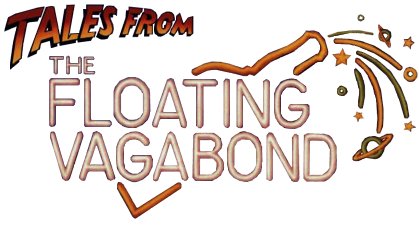
Tales from the Floating Vagabond Part 0: Ludicrous Adventure in a Universe Whose Natural Laws are Out To Lunch!
Tales from the Floating Vagabond was a comedic RPG by Lee Garvin, published by Avalon Hill in 1991. It’s a kitchen sink of a game, leaning a little toward a saturday morning cartoon feel. The kind of cartoons where the heroes are a random assortment of unrelated stereotypes. And they have adventures in space. And they drive a Cadillac and fight Nazis. In space.
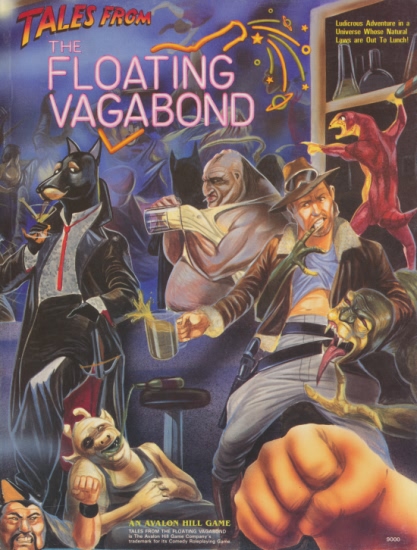
Introduction
The book opens up, even before the table of contents and disclaimers and such, with an introduction to the setting. At the beginning of time, the Forces of Nature and the Laws of Physics, under contract by the Big Guy himself, created the Multiverse. Like any construction job, they had a bunch of random materials left over when they were done. They just dumped it all into a pocket dimension and called it a day.
Eventually, all this crap fermented (there’s a lot of booze metaphors in this game) into a more or less full-fledged reality, complete with life forms. When they came back and saw the mess, the Powers and Laws, after careful consideration, decided ‘fuck it’ and went to get drunk.
Hawk “Spit” Luger, a member of the Bartenders’ Ancient Brotherhood (BartAB), a union so powerful that its bylaws are stronger than physical laws, happened to live in this dimension, and established the one enterprise all sentient beings need: a good bar. Yes, he was a bartender before there were any bars. The Floating Vagabond is on the largest rock in an asteroid field in the center of the universe.
Things were going great, until the Crane’s Nest opened up on a nearby planet. Spit couldn’t compete with Solomon Crane’s unscrupulous business practices, like “Happy Year” specials, full-contact billiards tournaments, or wet T-Shirt night, so he decided to take drastic measures.
Spit bought a Random Dimensional Portal Generator from a mad science company called W.A.R.P., and installed it on his front door. This turned the door into a portal that connects randomly to any other bar in any space or time in the Multiverse. People walk into their local Paddy’s Pub, and find themselves instead a jillion miles in another dimension. Naturally, the first thing they do upon discovering they’re no longer in Kansas to order a series of long, hard drinks. The Vagabond’s business has never been better.
If you’re wondering now why lower prices and casual sexism are more unscrupulous than randomly abducting customers with no plans of sending them home , then you’re not in the right mindset for this game.
Table of Contents, Credits, and Disclaimer
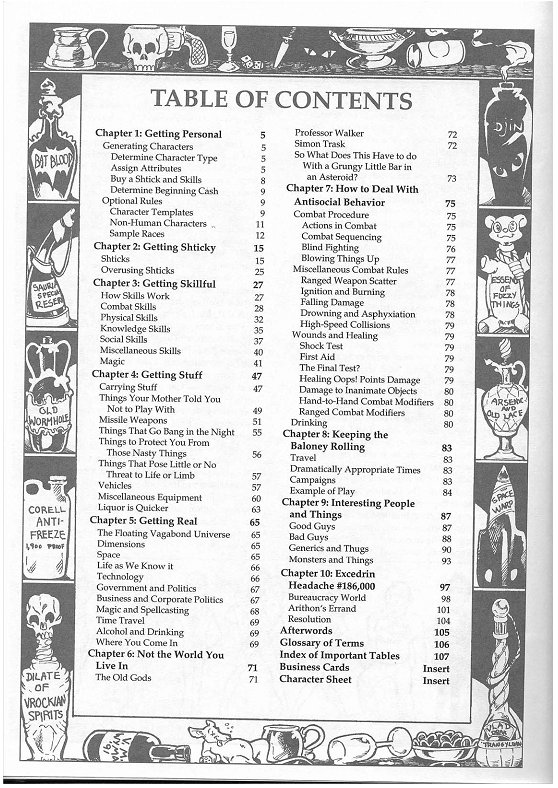
Nothing too special about the ToC, except that it’s framed by shelves of booze. If you can’t read them, the bottles are labeled:
Bat Blood
Djin
Saurian Special Reserve
Essence of Fuzzy Things (the bottle is a teddy bear. Wearing a noose. Must have been imported from Al Amarja.)
Old Wormhole
Arsenic and Old Lace
Corell Anti-Freeze 1,900 proof
Space Warp (the bottle is shaped like a rocket)
Dilate of Vrockian Spirits
Vlad Drak Transylvanian (I think)
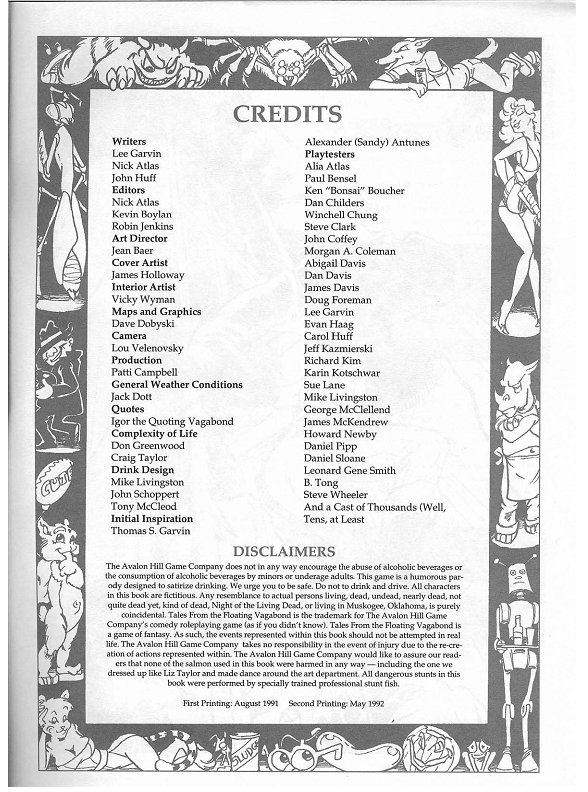
The next page credits the same number of drink designers as writers. One interesting thing is that there’s exactly one name under interior artist: Vicky Wyman. She did all of the artwork except for the cover, and there’s a LOT of it. I’d say about a third of the total page space of this book is art. I’ll try to pick out the pieces that are most representative, or at least the funniest.
Finally, the disclaimer, reproduced here in its entirety without comment:
The Disclaimer posted:
The Avalon Hill Game Company does not in any way encourage the abuse of alcoholic beverages by minors or underage adults. This game is a humorous parody designed to satirize drinking. We urge you to be safe. Do not to drink and drive. All characters in this book are fictitious. Any resemblance to actual persons living, dead, undead, nearly dead, not quite dead yet, kind of dead, Night of the Living Dead, or living in Muskogee, Oklahoma, is purely coincidental. Tales From the Floating Vagabond is the trademark for The Avalon Hill Game Company’s comedy roleplaying game (as if you didn’t know). Tales From the Floating Vagabond is a game of fantasy. As such, the events represented within this book should not be attempted in real life. The Avalon Hill Game Company takes no responsibility in the event of injury due to the re-creation of actions represented within. The Avalon Hill Game Company would like to assure our readers that none of the salmon used in this book were harmed in any way -- including the one we dressed up like Liz Taylor and made dance around the art department. All dangerous stunts in this book were performed by specially trained professional stunt fish.
I'd also like to mention that Garvin is working on a 2nd edition of the game. Details are scarce, but as far as I know progress is still being made.
Getting Personal
Original SA post
The intro was super short, and I’m bored at work, so here’s some more Vagabond.

Tales From the Floating Vagabond Chapter 1: Getting Personal
Life is like an anole. Sometimes it’s green, sometimes it’s brown, but it’s always a small Caribbean lizard.
I don’t know what that means, either. The game is littered with these odd quotes presented without context.
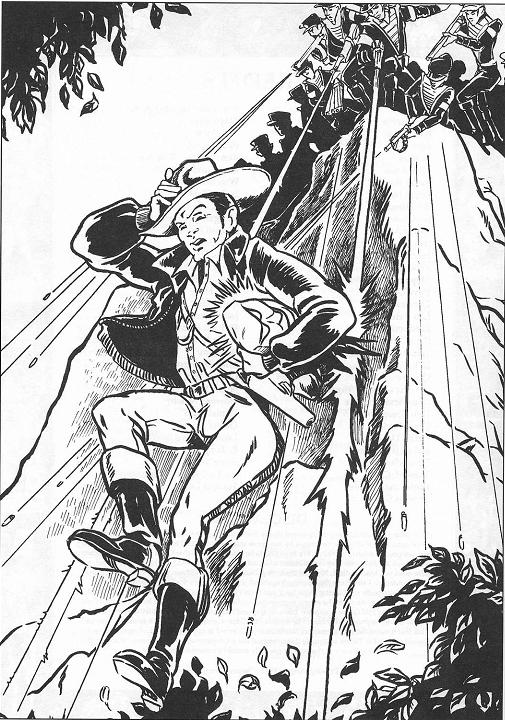
Each chapter is narrated by one of the major NPCs of the game. Well, by major NPC I mean person that you are likely to find at the Floating Vagabond. That dude up there making his narrow escape from pissed off Space Nazis is Arithon Kinkade. You get zero points for guessing what his archetype is.
At the start of the chapter, we’re treated to a quote from the featured character, as well as his stat block. Here’s Arithon!
Stat block posted:
Arithon Beauregarde Kinkade
Homo Sapiens
Adventurer
“So, Simon. You get these goons bulk rate or what? Get it, bulk rate?! Bwa-ha-ha!”
Strength: 2 Nimble: 2 Aim: 4
Smarts: 2 Cool: 4 Common Sense: 2
Luck: 7 Oops! Points: 19
Shtick: “It’d Take a Miracle!” Effect
Con (Smarts) Hack 4
Dodge (Nimbleness) Dabbler 3
Duck (Nimbleness) Dabbler 3
Fast Talk (Cool) Hack 6
Hurt People (Strength) Expert 5
Make Wiseass Remark (Cool) Professional 8
Shoot Things (Aim) Professional 8
Arithon introduces himself as Spit’s silent partner, who provides some of the capital for the bar with the proceeds from his adventures, and gets to hang out and get wasted full time in exchange. He gives the basic spiel of what you’ll need to play (the dice used in this game are 4-sided, 6-sided, 10-sided, 20-sided, 30-sided(!), and 100-sided), and defines the 3 kinds of participants in the game: Players, Game Masters, and Kibitzers.
Players are called Patrons in this game, the Game Master is called the Bartender, and Kibitzers are never mentioned again.
From here, it’s straight into character creation, broken down into steps.
Step 1: Determine Character Type You can explicitly play anyone you want, from anywhere you want, from any time you want. You can be a spaceman, a caveman, or an ambulatory potted plant. The one suggestion is to make a character that spends a lot of time in a bar.
Step 2: Assign Attributes A pretty simple point-buy system. You get 20 points, and you can spend them on 7 attributes: Strength, Nimbleness, Aim, Smarts, Cool, Common Sense, and Luck. There’s also Oops! Points, but those are derived from your other attributes. 2 is an average person, while 6 is the pinnacle of human achievement.
You have to spend at least 1 point in each attribute. They cost 1 per point up to 6, then 2 per point after that. So an attribute of 8 costs a total of 10 points: 1 each for the first 6, then 4 more for the last 2.
Strength Strength 1 is a 98-pound weakling, 6 is the guy who eats granola and gravel for breakfast and benchpresses cattle.
Nimbleness Nimbleness 1 is a guy who has trouble climbing out of bed without hurting himself. A guy with 6 is a black-belt ballet dancer. Bonus: If you create a character of Nimbleness 6 or higher, roll a d100. If you get 10 or less, you’re double-jointed and get a free bonus to Acrobat and Dodge skills. No, I don’t know why you don’t just roll a d10 and hope for a 1.
Aim Aim 1 can’t hit a bullet with the broad side of a barn. A guy with 6 could perform a vasectomy on a hamster using a crossbow at 100 paces. Bonus: If your aim is 4 or higher, then you have a 5/100 chance of being ambidextrous. I don’t think this has any mechanical effect. Arithon recommends holding a drink in your off hand.
Smarts Smarts 1 is a degenerate moron. Smarts 6 is the guy who calculates rocket thrust vectors in his head.
Cool As in keeping your cool. Cool 1 is the archetypical
Common Sense Common Sense 1 puts his shoes on before his pants. Common Sense 6 could give useful advice to Confucius.
Luck Luck 1 would have a plane crash onto his car while he was driving somewhere because he was afraid to fly (THAT is irony Alanis). Luck 6 would find the $23 million lottery ticket stuck to the bottom of his shoe. You can spend luck points to modify a die roll by 1d4 (it doesn’t say if this is before or after you make the roll). You get your spent luck points back at the next gaming session or when you bribe the Bartender.
Oops! Points They’re just hit points by another name. You don’t spend points on them, instead you have a number equal to
Hold up a minute right there. See, in the second printing(which is what I have), there’s a teeny tiny typo that makes the game unplayable. It’s not supposed to be the average of your strength and luck; it’s supposed to be Strength + Luck +2d6. When I got this game, I wasn’t even on USENET yet, so I never even knew that it was wrong, and we couldn’t figure out every single NPC, no matter how mookish they were supposed to be, was about twice as tough as any PC. I promise to bitch about this some more in the future.
Anyway. If you run out of Oops! Points, you make a Normal (1d10) Luck test, penalized by how far below 0 you are. If you pass, you’re unconscious, if you fail you’re dead.
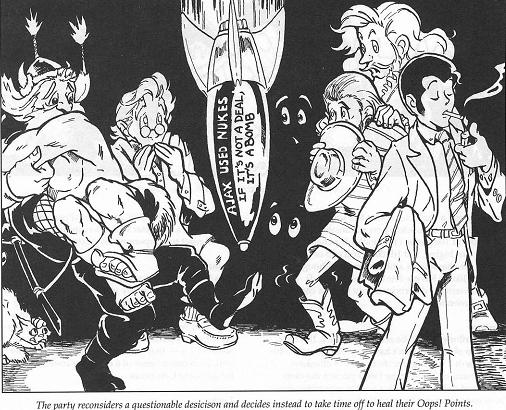
Step 3: Buy a Shtick and Skills Oh hey we’re still counting. Anyway, now you get a new pool of points to spend. This time, you get 1,500 points to spend. You get one Shtick, then spend the rest on skills. These will get explained later.
Step 4: Determine Beginning Cash Choose the highest of your Smarts, Common Sense, or Luck, and add 4d10. Then multply by 100. This is how many Bucks you have to spend.
That’s it, you’re ready to go.
For the lazy players, it provides a bunch of template characters for quicker creation. The archetypes they offer are the Tough Guy, Swashbuckler, Gunslinger/Bounty Hunter, Wizard/Rocket Scientist, Smooth Operator, Bartended (not to be confused with the Bartender, I guess), and Adventurer.
Oh, and remember when I mentioned you could be a potted plant? Yeah, the rules for playing non-human characters come after you’ve already made your character. It gives rules that you can use to make up ANYTHING. You just decide what its advantages and disadvantages are, in terms of attribute and kill bonuses and penalties, then decide if they have any special abilities, and you’re good to go.
A race’s attribute modifiers work like this: If they’re good at something, they get a few levels of that attribute at half cost. If they’re bad at something, they start paying double for it before 6.
Skill modifiers are either a straight bonus to that race’s skill score, or they pay double for an entire category of skills.
Other advantages are a little more ad-hoc. If it’s not just armored skin or a natural attack, it’ll probably take the form of inventing a special skill that the character then buys as normal.
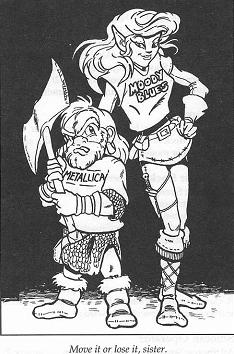
I love this picture, dunno why
A few premade races are available to choose from:
Elf ( Faerie Sapiens ) Flower children that are low on strength and common sense, but good at nimbleness, aim, smarts, cool, and looking good at all times.
Dwarf ( Diminutus Sapiens ) The opposite of elves. They get a bonus to drinking and mining, but pay double for social skills.
Dogman ( Canis Sapiens ) Good at aim and common sense, but bad at keeping their cool. They get a bonus to the tracking skill.
Rhinoskin ( Rhinoceros Sapiens ) Rhino people. They have armored skin, get Strength at half price all the way up to 6, and get a bonus to breaking things and hurting people.
Disgustingly Cute Furry Thing ( Nauseas Sapiens ) Disney characters. They’re shafted as far as strength and common sense, but ridiculously lucky.
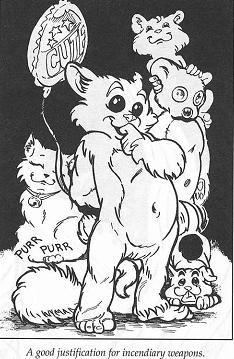
So, yeah, your choices are human, standard fantasy race, or furry.
And on that note, Chapter 1 ends.
Getting Shticky
Original SA post
Tales From the Floating Vagabond Chapter 2: Getting Shticky
I'll follow you, but first ya gotta explain again how the extraterrestrial penguins got involved in this.
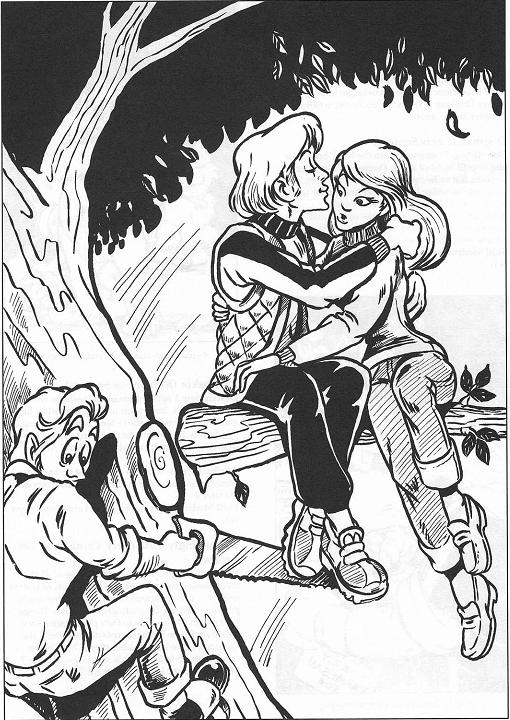
Our host for chapter 2 is Biff Cantrell. Biff is a bro. He's in his senior year at the Massachusetts Institute for the Shallow and Extremely Rich when he got zapped to the Floating Vagabond during a keg run for his frat. Now he hangs out with Arithon and hits on anything with tits.
I'm not really sure what role Biff fills as an NPC. I guess he's handy if you need a drinking partner, or someone to make the female PCs uncomfortable. Whatever, I don't care about Biff. Let's move on to what the chapter's actually about.
Shticks are one of the defining features of TFtFV. They're a lot like the powers in Cosmic Encounter, actually: Everyone gets one and they all break the game.
If you remember, PCs get 1500 points to split between their shtick and their skills. Choosing a shtick costs 500 points, or you can roll to get a random shtick for 200 points, which is a bargain if you've made it this far without a coherent character concept.
Every shtick gets a major effect, and most get a minor effect. As an added bonus, no attempt was made to balance them to each other.
Schwarzenegger Effect
This is one of the boring shticks, honestly, and if you haven't fixed the Oops! points typo it's outright worthless. Normally, every character that takes damage equal to or greater than their strength has to make a strength test or be knocked out. A character with the Schwarzenegger Effect can't be knocked out until they reach 0, and even then get a bonus to their roll to stay alive. On the other hand, the character doesn't get to know how many points they have left. They just trudge along with no idea how badly off they are until they keel over. The minor effect is that they may not receive any medical aid other than First Aid while in view of other sentients.
Notice that this character isn't actually taking any less damage. They aren't any tougher. They're just too dumb to tell they're dying.
Rambo Effect
Simply, the character with this effect can't be hit by ranged weapons fired from Close range. Any farther than that is fair game, though. The minor effect is that enemies will choose this character over his allies 80% of the time. Optionally, they replace 'these' and 'those' with 'dese' and 'dose.'
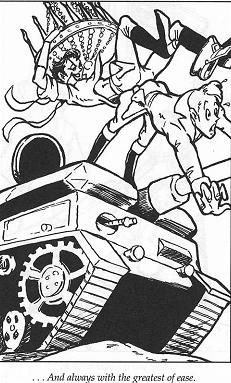
Flynn Effect
Yeeessssss. Any time this character needs one, there's a handy chandelier, vine, rope, snake, wire, or whatever available at hand. Always. Even in space. The minor effect is that you can never make an easy entrance or exit. But why would you use a door when you can rope swing through the window every time ?
Roy Rogers Effect
Trick shooting. With this effect, you ignore all modifiers for movement and cover. You can be on horseback shooting at someone hiding behind a rock around the corner, and it doesn't affect your chances.
This shtick has two minor effects. The first is that your horse (or motorcycle or space bike or spacehorse) is always available; just whistle and it will position itself someplace that you can drop a great distance (safely) onto it and ride away.
The other minor effect is that you can't kill anyone: you'll always knock them out or disarm them instead. The one exception is a formal showdown, at high noon, when the enemy goes for his gun first.
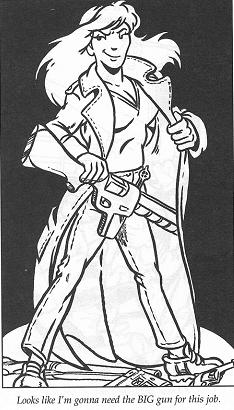
Trenchcoat Effect
Outerwear of holding. You can cram any number of items into the coat, so long as they're not actually bigger than you are. You can also make a luck check to randomly find any random small useful item, but someone else has to suggest it. Getting frisked can take a while.
Random trivia: Parker Lewis Can't Lose came out a year before this game.... Hmm.
Newton Effect
The antifunhaver effect. If you see someone doing something that you think is impossible, then you can make an opposed test against them to make them cut it out. You can also never knowingly try to do anything you believe is impossible.
Merlin Effect
This actually should have been called the Sherlock Effect, in my opinion. Whenever you meet someone new, make an opposed check of your Smarts against their Cool. If you win, then you know an eerie amount of personal details about that person, including name, profession, date of birth, mother's maiden name, and what they had for breakfast. I think it's just called the Merlin effect to encourage all spellcasters to be insufferable assholes.
As a minor effect, you sometimes know about danger a split second before it happens, just enough time to duck.
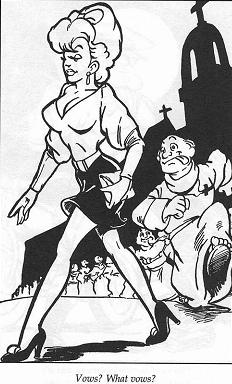
Valentino Effect
The major effect is that all members of the opposite sex have to pass a Hard Cool test or metaphorically throw themselves at your feet. They will do anything for you.
The minor effect is that all the victims of the shtick are jealous of each other and will fight to the death over you unless you stop them.
Bylaw Effect
This is actually a bunch of shticks pretending to be one. A character with this shtick is a member of one of the most powerful groups in the universe since the Illuminati: a trade union. The major effect depends on what union you choose to join.
-
Bartender's Ancient Brotherhood (BartAB): A bartender can never die while on duty, nor do they take any damage from an attack unless it knocks them out in one go.
-
Curious Order of Policemen (C.O.P.): A get out of jail free card. This only applies to you, not your friends.
-
Teamster's Righteously United Kindred (T.R.U.K.): You can always get transportation for yourself and anything you need to haul, no matter how far the trip. They get paid by the mile.
-
Eclectic Villain's Interdimensional League (E.V.I.L.): For NPCs only. These guys can never be permanently captured or killed, they will always come back.
-
Righteously Indignant Good-guys and Heroes against Tyranny: The opposite of E.V.I.L. They're not as well funded, so you only get your poorly explained return from the dead if you died fighting a member of E.V.I.L., and only up to five times.
-
Organization of Athletic Figures (O.A.F.): If you get injured for any reason other than combat, you can scream for your manager, who will bitch out the Bartender about endangering team property, letting you escape during the distraction.
-
Trained Henchmen United for Goodwill (T.H.U.G.): If you get in trouble, you can call on your fellow thugs for help. 3d4 generic rent-a-thugs will show up, join you in the fight, and vanish as quickly as they arrived.
The minor effect is the same for all the unions: You're always bumping into other members and exchanging secret handshakes. Also, you have to pay monthly dues.
Murphy Effect
Murphy's Law sorta kinda works for you. You can choose to have something go inexplicably wrong for someone else. On the other hand, you can't use that power again until something goes wrong for you. Mishaps come in the form of guns jamming, ropes breaking, springs snapping, actors forgetting lines, I.R.S. agents misplacing tax records, and so on.
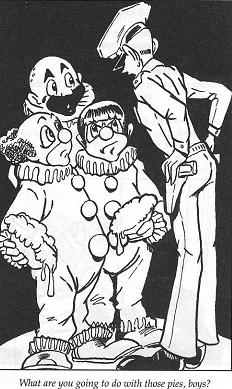
Howard, Fine, and Howard
This is one of the best shticks. So long as you have an accomplice (they don't need the same shtick, but it works better if they do) you can perform a confusing comedy routine along the lines of the Marx Brothers or Three Stooges. So long as you've got the patter going, every NPC you interact with has their Smarts and Common Sense reduced to 0.
As a minor effect, you always have a cream pie close to hand. If you hit someone with it, they have to make a Hard Cool test or they also throw a pie that just happens to be handy. Whoever they hit will also have to make a test, and so on.
John Doe Effect
You have One Of Those Faces. You're always being mistaken for someone else. If you bump into a mob boss, you'll look just like the guy that owes him money. Drop you into a tribe of savage muppets, and you'll look just like that god statue over there.
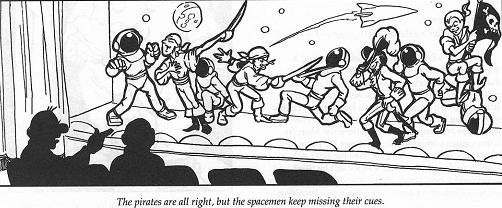
Rodgers and Hammerstein Effect
This comes in two varieties. If you take the Theme Music effect, then you've got your own soundtrack. All the time. It changes based on the situation. So when you're talking to the Chancellor and the Imperial Death March kicks in, you know that he's not to be trusted. The music gets louder during fights, giving your enemies a -1 penalty to stuff due to the distraction. On the other hand, it's hard to sneak around.
The other variety is the Musical Effect. If you take this, you have to sing your feelings at any dramatic moment. If you're in a fight or a similar crowd scene, everyone joins in . Even if they don't know you're there because you're hiding. Both sides add up their total Cool values, +2 for the person with the shtick, and the coolest side gets +2 to all their skills during the fight.
Dolittle Effect
It's basically the Valentino effect, but for animals. Except they don't try to fuck you, thankfully. Also, they don't fight each other to the death.
It'd Take a Miracle Effect
This is the shtick for the lucky. In any time of great stress, think of some ridiculously unlikely turn of events that would save the day. Something like 'If only there was a used mattress dump site at the bottom of this chasm.' If you pass a Normal Luck test, hooray!
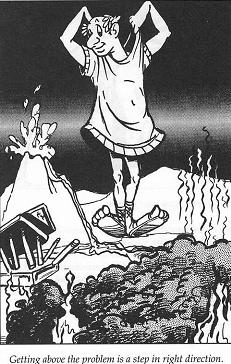
Escher Effect
You have the ability to ignore the Laws of Physics, whether because you're too dumb to know you can't, or just because you're too much of a rebel to be chained down by rules. If you're unlucky, the Laws of Physics will get sick of your abuse and kick back in at inopportune times.
Sidekick
You get a sidekick, blah blah blah. If you take this shtick, you can buy a second shtick.
Archenemy
Some villain is out to get you personally. This also doesn't count as your one shtick. Presumably, you could have an archenemy, a sidekick, AND a regular shtick.
The chapter wraps up with some advice on how to dick over players that overuse their shticks. Basic asshole DM stuff, like having the Trenchcoat guy pull out a ticking bomb.
Obviously, there's nothing keeping you from making your own shticks, but it doesn't give any guidelines or anything.
Getting Skillful
Original SA post
Tales from the Floating Vagabond Part 3: Getting Skillful
Where did you get that book and why are you glowing?
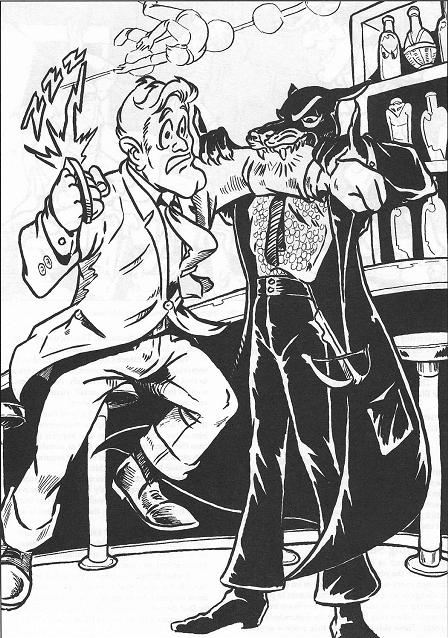
That charming dude with the teeth there is Bugshoe. Obviously, based on his name and sweet trenchcoat, he’s a private investigator. Nope, actually he’s a bounty hunter. Because dogs chase things! And, that’s about it. We eventually learn that he has an ex-wife he doesn’t talk about, and an extended family that occasionally call on him for favors, money, or a place to crash.
Stat block posted:
Gumshoe
Canis Sapiens
Bounty Hunter
“Hold still, and it’ll only hurt a lot. Or move. I don’t care.”
Strength: 3 Nimble: 2 Aim: 6
Smarts: 3 Cool: 3 Common Sense: 4
Luck: 2 Oops! Points: 15
Shtick: Trenchcoat Effect
Chase Cars (Nimbleness) Expert 5
Dodge (Nimbleness) Professional 6
Duck (Nimbleness) Expert 5
Fling Primitive Missiles (Aim) Professional 10
Hurt People (Strength) Dabbler 4
Intimidate (Cool) Expert 6
Notice Detail (Aim) Hack 8
Shoot Things (Aim) Hack 8
Survival (Common Sense) Hack 6
Throw (Aim) Professional 10
Track With Unnerving Accuracy (Common Sense) Professional 9
Now we finally learn what all those numbers mean in the skill section. It’s actually pretty simple. A character can have up to four levels in a skill, and each level adds directly to your Attribute when you use it. Each level of a skill has the same cost to purchase, but different skills have different costs.The levels are
pre:
Dabbler +1 Hack +2 Expert +3 Professional +4
Skill tests are rolled on a single die. If you roll less than your Attribute + Skill, you succeed! The unique thing is that there are no modifiers to skill rolls. Instead, the difficulty of the task determines which size die you roll!
pre:
Pitifully Easy 1d4 Easy 1d6 Normal 1d10 Hard 1d20 Very Hard 1d30 Nigh Impossible 1d100
This, by the way, is where we first see the basic gameplay principle of this game: fuck it, make something up. It doesn’t care about carefully measuring distances and advantages.
Oh, and if you need to match your skill against someone else’s, you just both roll 1d10, add your Attribute + Skill, highest total wins.
Finally, we get to the list(s) of skills. The skills are divided into categories, which really only matters for organization. The first category is Combat Skills. This being an RPG, combat will get a whole chapter to itself later, but for now it just notes that rolls in combat are almost always normal (1d10).
Here’s the skills, with the appropriate Attribute, their default modifier (-- if you can’t use it untrained), and their cost
Berserker Rage (Strength --) 200 : The ability to just completely lose your shit. Every time you’re in a fight, you make a Normal (1d10) test using your Berserker Rage score. If you succeed, you flip out and go aggro on everything. In hand-to-hand combat, you add your berserker rage skill level to your attack skill and damage rolls. In ranged combat, you get an extra shot for each skill level you have, but take an equal penalty to your hit rolls. In either case, you have to keep attacking your target until it is dead, then you have to move on to a new target, friend or foe, unless you pass an optional Normal Cool test.
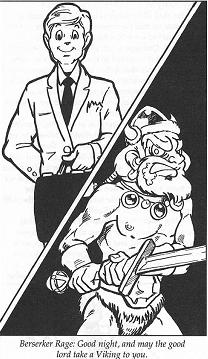
Blow Things Up (Smarts --) 200 : Your basic set-it-and-forget-it method of murder. The full rules for this are in another chapter, so we'll come back to it.
Dodge (Nimbleness +0) 50 : You use this skill to try to not be hit in melee. After an enemy has hit you, you roll 1d10 and subtract the result from your Dodge score. If the result is positive, add that retroactively to the roll the enemy made to hit you. Which might make him not have hit you.
Duck (Nimbleness --) 50 : It's just like Dodge, but for ranged attacks.
Fling Primitive Missile (Aim -2)100 : This is your skill in any kind of ranged weapon that doesn't involve gunpowder or lasers or whatever. Bows, crossbows, atlatls, slingshots, whatever.
Gunnery (Aim -4) 100 : This is the skill in shooting guns you can't carry, like howitzers or tank cannons. It's actually three different skills, affecting three sizes of gun: Incredibly Big Gun, My God That's a Big Gun, or Don't Point That at My Planet Gun. Choose one when you take the skill.
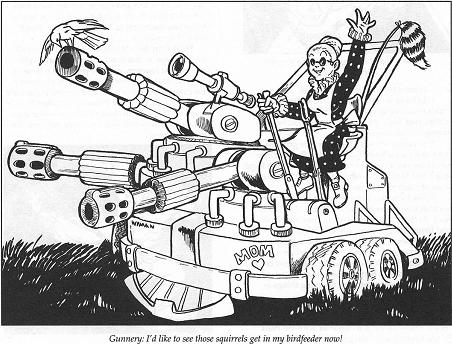
Headbutt (Strength -1) 100 : It doesn't actually say what this skill does here. We'll see if they remember it by the time we get to combat.
Hurt People (Strength -2) 100 : This is the skill for maiming people with your bare hands. It's the straightforward brawling skill, with a base damage of 1d6/2, + Strength Damage Bonus.
Hurt People Really Badly (Aim -4) 100 : The Kung Fu skill. You have to have the regular Hurt People skill at Expert level first. You get a number of attacks equal to your Nimbleness / 2, and the damage is 1d6 with no Strength bonus.
Shoot Things (Aim -2) 100 : The ability to point a gun at something, pull the trigger, and make the target disappear with a bang! It comes in three varieties: Gun, Big Gun, or Really Big Gun.
Swing Short Nasty Pointy Thing (Strength -2) 100 : Pointy is loosely applied here, this skill is used for knives, beer bottles, ice picks, etc. You get a number of attacks equal to Nimbleness / 3, but no Strength bonus.
Swing Nasty Pointy Thing (Strength -2) 100 : Your basic swing a sword melee move. Again, "pointy" is a state of mind, not a strict requirement. One attack per round.
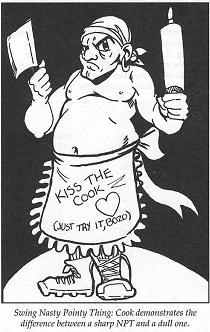
Swing Nasty Pointy Thing With Panache (Nimbleness --) 100 : Swashbuckling! You get more attacks, at the cost of your strength bonus.
Swing Long Nasty Pointy Thing (Strength -3) 100 : This variation of the same joke applies to pikes, halberds, bec de corbins, guisarme-glaives, etc.
Target Vomiting (Aim --) 100 : Someone will take this, and they will use it. You know they will. It doesn't do any damage, but it does make the footing in the area slippery, and reduces the target's Cool by 1d6. If this drops their Cool to 0 they are completely grossed out and try to get away from you.
Throw (Aim -2) 50 : The skill of making a grenade go from here to there.
Whips & Chains (Nimbleness -4) 100 : Mostly recreational, but you can use this skill in combat, too.
Out of time right now, so I'll get the other categories next time.
Continuing to Get Skillful
Original SA post
Tales from the Floating Vagabond Part 3.5
OK, let's see if I can finish off the skill chapter. Next up we have the physical skills:
Again, it's Skill (Ability DefaultModifier) Cost:
Acrobatics (Nimbleness -3) 100 : Tightrope walking, walking on your hands, and other silly stunts. Also you can apparently add any levels you buy of this to your Dodge or Duck checks, which isn't mentioned anywhere in a combat section.
Break Things (Strength +0) 50 : Not just using your brute force to disassemble things, you can also use this skill to judge how much force you WOULD need to use. However if you have any levels of this skill, then any time you're near something fragile or delicate you have to make a Normal (1d10) test against Nimbleness or else you attempt to break it. On accident, of course!
Chase Cars (Nimbleness --) 100 : You use this skill to follow cars and other vehicles. If you actually want to CATCH them, you have to make a Very Hard Nimbleness test also. If you don't want to chase a car, pass a Hard (1d20) Cool test to resist the urge. Barking is optional.
Climb ([(Strength + Nimbleness) / 2] -4) 100 : Man, it's super awkward to write out the stat for this. It's based off the average of your strength and nimbleness, if that wasn't clear. Anyway, you go up and down shit. They couldn't think of a good joke for this skill and neither can I.
Drive Vehicle ([Nimbleness + Aim] /2 --) 50 : Pick a category of vehicle, like automobile, boat, jet, or spacecraft. You need to have at least Dabbler to operate a vehicle, unless you have a similar Drive Vehicle skill, in which case you can make a Hard test to try and figure it out. If you know how to drive, you only have to make skill tests when you do something dangerous and/or stupid.
Juggle (Nimbleness --) 100 : For each skill level you have, you can handle one object more than you have hands (or equivalent). I'm sure this is very useful.
Jump (Strength +0) 100 : For some reason, this game actually cares exactly how many feet you can jump. Each skill level you take adds 2' to your jumping distance, on top of your base distance. Which I just noticed is based on Nimbleness while the skill is based on strength. I don't know why. You basically never care about exact distances the rest of the time, but I guess jumping is super important?
Lift Things (Strength +0) 100 : The basic skill for lugging stuff around. This is another one that you typically don't role, it just gives you passive carrying capacity.
Operate Heavy Machinery (Aim --) 100 : I'm 99% sure this skill exists purely to complement Power Drinking.
Pick Lock (Aim -5) 100 : This covers all forms of locks, from padlocks to retinal security systems, only the difficulty changes.
Pick Pocket (Nimbleness -5) 100 : Let's enable the shit out of some PvP griefing!
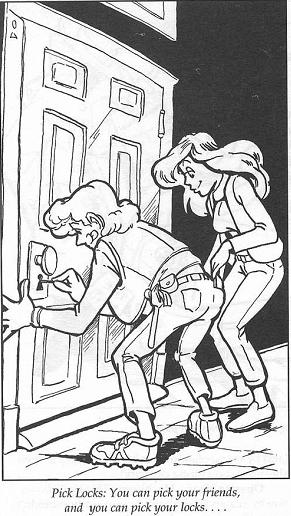
Power Drinking (Strength ??) 100 : Each skill level you take is an extra level of intoxication you can handle before you start making tests. It doesn't list any default level, so I guess you can't roll against this when racing to the bottom of a 40 or whatever.
Run Real Fast (Nimbleness +0) 50 : Sooner or later, you're going to need this.
Sports ([(Strength + Nimbleness) / 2] -1) 100 : Pick a sport. Any sport. Examples include: Autoclave swallowing, Baseball, Cricket, Diving, Dwarf Tossing, Elevator Racing, Football, Golf, Handball, Ice Hockey, Jai Alai, Lacrosse, Mondo Pool, Nova Surfing, Ostrich Wrestling, Polo, Quoits, Racquetball, Soccer, Synchronized Boxing, Underwater Basketball, Variable-Gravity Lasercrosse, Water-Skiing, Xylophone Taming, Yachting, Zeppelin Rodeo, and so on.
Swim (Strength + 1) 50 : If you don't have this skill, all you can do is dog-paddle. Bugshoe does not have this skill.
The next category is knowledge skills. The game makes special note that even though these generally represent careful study and mental tinkering, there's no reason you can't abuse these skills for destructive purposes.
Abnormal Physics (Smarts --) 100 : This skill lets you understand what's going on when the normal Laws of Physics don't apply. It lets you predict what the likely consequence of a given action or turn of events will be. This skill is mutually exclusive with the normal Physics skill.
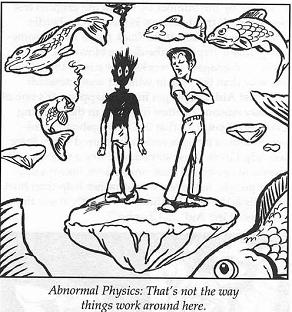
Calculate (Smarts -2) 100 : This lets you solve all those formulas and problems you flunked in school. Also provides a bonus to gambling.
Deduce (Common Sense -2) 200 : This lets you figure out valuable insights about a situation, place, or person from seemingly meaningless subtle clues. Or you could just get the Merlin shtick.
Fiddle With Electronic Gadgets (Smarts --) 100 : The skill to repair, modify, or upgrade gizmos. If you fuck up and are unlucky, it might blow up!
First Aid (Smarts -3) 100 : The healing rules will covered later.
Human Encyclopedia (Smarts --) 300 : You know a little bit about everything. You can make knowledge checks about anything but it's always one difficulty higher, and you can't specialize in specific knowledges.
Invent (Smarts --) 300 : The skill to make a new game breaking item out of spare parts. The stranger it is, the harder it is to make. Anything transdimensional is always Nigh Impossible (1d100). Mutually exclusive with Cast Spells.
Medicine (Smarts --) 200 : You have to start with First Aid to take this. Again, healing is covered later.
Mess With Dangerous Goop (Common Sense --) 100 : The chemistry/alchemy version of invent. There's a whole d20 table covering what happens when you fuck up. Highlights: 13- A new lifeform arises from the ooze and begins picketing your mistreatment of plasmoids. 18- You create an invisibility formula. Unfortunately the container is now invisible and you can't find it. 20- Something weird happens.
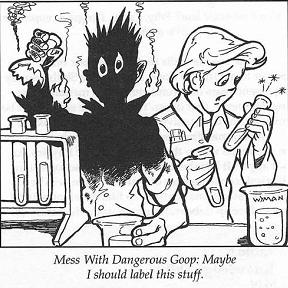
Physics (Smarts --) 100 : For some reason, this skill is almost always used to calculate ballistic trajectories.
Psychoanalysis (Common Sense --) 100 : This is both the skill to cure insanity, and to drive someone insane. There are 6 levels of sanity, ranging from Very Together to Totally Buggo.
Trivia (Smarts +0) 100 : You can only use this skill on minor facts of little significance, otherwise it functions like Human Encyclopedia.
Phew. Not much further. You know what, I have no idea why I didn't just paste in the table. It would have been much easier. I'm going to that, and just cover the highlights from here out.
Next category is social skills, which are actually about as useful as combat skills in this game, really.
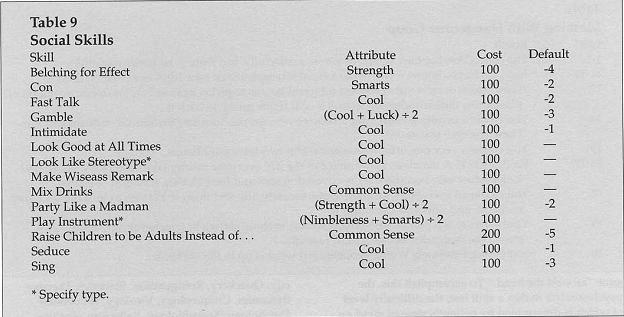
God, that's so much easier. I'm an idiot. Anyway...
Belching for Effect : When they say effect, they mean it. You can terrify your enemies, simulate a Centaurian Horse-Frog's mating call, or just amuse children. You have to be at least a little drunk to do this, though.
Look Like Stereotype : You choose a stereotype, and then make a Normal skill test for every new person you meet. If you pass, they see you as that stereotype and can't be convinced otherwise. I'm glad this game was made in the 90s; if it was made today, it would just link to tvtropes here.
Raise Children to be Adults Instead of Game Designers : Not so much a skill as advice for any parents that might be reading the rules.
Party Like a Madman : With this skill, you always know where a nearby party is. If there isn't a party nearby, you know where the nearest raw materials to make a party are.
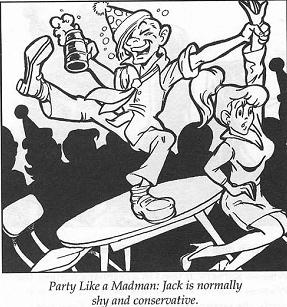
Finally, we've got the miscellaneous category, for the skills that didn't fit anywhere else.
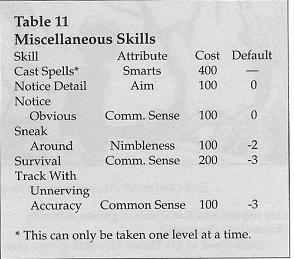
Notice Detail : This is your basic spot hidden skill.
Notice Obvious : On the other hand, this skill is the game's idiot-proofing mechanism. When the players are just too oblivious to find the plot, the bartender can have them test this skill. If he wants to. Or he can just hang them out to dry.
Cast Spells : Each level of Cast Spells gives you access to a new batch of spells, and gives you spell points equal to your smarts. You don't have to learn individual spells, you just get the whole level's worth in one go.
The spells are your pretty standard fantasy fare, ranging from invisibility and telekinesis at Dabbler up to being able to banish people to prison dimensions or explode their heads at Professional level. Magic would be completely broken and overpowered, except that everyone should be pulling off this stuff. Yeah, maybe the wizard can teleport as far as he can see, but the non-caster can drive his Cadillac to the space bar.
Phew. Honestly, I didn't expect to be so annoyed at this section. I've never had any problem with the skills in play, but when I actually go through and read them with an eye toward reporting on them, all the flaws seem to bubble up to the surface. The important thing to remember is that it really doesn't matter: Stick to the basic principle of pulling a difficulty out of your ass and rolling against your skill, no need to get bogged down in details like exactly how far you can jump.
Anyway, items are up next. Hope you like tables! Because goddamn there's a lot of amusing names and stuff, but I'm not typing them all out.